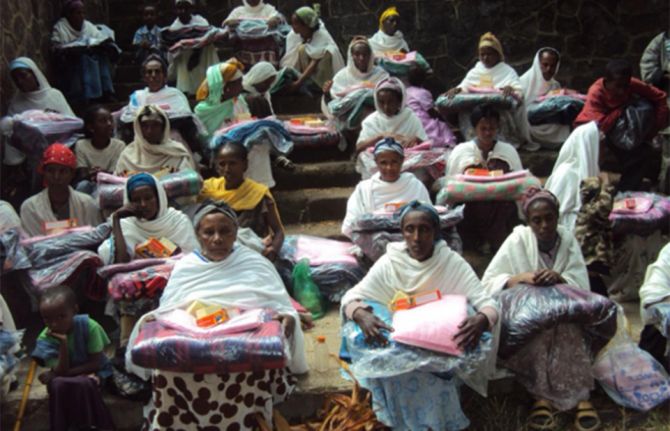
Feature Story
Stopping new HIV infections among children a key priority for new OAFLA chair
31 January 2012
31 January 2012 31 January 2012
First Lady of Namibia and OAFLA President Penehupifo Pohamba (pictured left) at the 11th OAFLA General Assembly, together with the First Lady of Chad, Hinda Déby Into (centre) and the Ethiopian First Lady, Azeb Mesfin.
Credit: UNAIDS/J.Ose
Speaking at the 11th General Assembly of the Organization of African First Ladies Against HIV/AIDS (OAFLA) on 30 January, Madame Penehupifo Pohamba, First Lady of Namibia, identified the prevention of new HIV infections among children as a key objective for her new term as President of OAFLA.
Madame Pohamba noted that in most African countries, lack of male involvement in sexual and reproductive health programmes is a challenge. She urged her fellow First Ladies to launch a continent-wide campaign to encourage the participation of male partners in efforts to stop new HIV infections in children.
“Let us conduct this campaign under the theme, An HIV-free generation tomorrow needs caring men and women today,” said the Namibian First Lady. “I believe that zero HIV infections among new born babies is an achievable goal,” she added.
Mrs Ban Soon-taek, wife of the United Nations Secretary-General, highlighted in her remarks the growing momentum and support for the goal of an HIV-free generation. “Around the world, in developing and developed countries, in the North and in the South, in the streets of communities and the halls of governments, people know that no child should be born with HIV,” said Mrs Ban.
According to the latest data from UNAIDS, WHO and UNICEF, there has been considerable progress over the past decade in reducing new HIV infections among children in sub-Saharan Africa. An estimated 350 000 children were newly infected with HIV in sub-Saharan Africa in 2010 compared to about 500 000 children in 2001—a 30% reduction. An estimated 230 000 children died from AIDS-related causes in 2010, down from about 320 000 in 2005.
I believe that zero HIV infections among new born babies is an achievable goal
Penehupifo Pohamba, First Lady of Namibia
In his keynote address at the OAFLA General Assembly, UNAIDS Executive Director Michel Sidibé applauded the First Ladies for their collective action in the HIV response across the continent. He said that through the strong leadership and advocacy of OAFLA members, 12 of 22 high burden countries in Africa had launched accelerated national plans to stop HIV transmission from mother to child. “The results of your efforts are increasingly visible and are making a difference in the lives of women, youth and children across Africa,” said Mr Sidibé.
Expressing concern over Africa’s dependency on external aid, the UNAIDS Executive Director requested the support of OAFLA members in mobilizing funding from local sources for HIV prevention, treatment and care. “Working with leaders of your countries, we need to focus all efforts on the issue of sustainable funding for the AIDS response. We must advocate for new partnerships with the private sector,” said Mr Sidibé.
According to a new UNAIDS issues brief — “AIDS dependency crisis: sourcing African solutions”—an estimated two-thirds of AIDS expenditures in Africa come from international funding sources. The vast majority of life-saving antiretroviral medicines consumed in Africa are imported from generic manufacturers.



